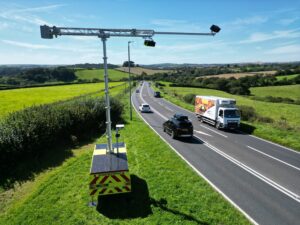Birmingham City Council and its partners have set out a vision for safer roads, prioritising people rather than vehicles in the city.
The partnership includes Birmingham City Council, West Midlands Police, the West Midlands Police and Crime Commissioner, Director of Transport for West Midlands and theregional Cycling and Walking Commissioner.
Chief Inspector Rebecca Barnsley, from the Central Motorway Policing Group, said: “West Midlands Police is committed to making our roads safer by tackling dangerous drivers, criminals and offenders who pose a serious risk to themselves and other road users.
“Since April, we have launched investigations into collisions where people have been killed on our roads as either a passenger, driver, cyclist or pedestrian. These truly sad and tragic incidents have brought devastation and loss to families and loved ones and we understand that people are concerned.
“We are working to bring to justice those responsible for causing the devastation and long life impact incidents like these have on victims, families and communities.
“However, that’s not the end of our work as we understand that we need to support our vulnerable road users. We do this by working with our, local authorities, the government, partners and voluntary sectors. Across the West Midlands we also have hundreds of volunteers who give up their time to help make our streets safer.
“Alongside our partners we will continue to listen to the community, target ‘hotspot’ areas and focus on increasing the safety of all road users across the West Midlands.
“We regularly conduct speeding operations and work with our local communities and volunteers with speedwatch operations in areas where we’ve been told that speeding is a concern.
“Local authorities have brought in car cruising injunctions across Birmingham and the Black Country which we police and conduct regular operations.
“However, not all collisions involve speeding drivers and we conduct regular traffic operations that target drivers who use the roads whilst under the influence of alcohol or drugs.
“We also conduct regular operations to tackle speeding and mobile phone use while driving and deal with safety issues like not wearing seatbelts, inappropriate child safety, and window tints which reduce vision.”
Councillor Liz Clements, cabinet member for transport at Birmingham City Council, said: “We’ve all been saddened by the recent terrible incidents on our roads involving cyclists and pedestrians and our thoughts are with families and friends of those affected. If we want our vision of better road safety to be a reality we can all agree that we can’t wait to make any necessary infrastructure changes.
“So, in order to do this quickly we must transform our existing public spaces so they prioritise people rather than vehicles – that is how we can achieve a change in behaviour.
“For far too long we have given priority to cars and other motor vehicles and this must change; we have set out in our transport plan how we want Birmingham to be a place to live and be, not drive and park.
“We want to see speed reduction from 40 to 30 mph on arterial roads in our inner city areas worst affected by dangerous driving and speeding and alongside police colleagues we will have a zero tolerance approach to enforcement. We will also pilot increased ‘green times’ for active travel modes at a number of signal controlled junctions and crossings giving greater priority to non-motor vehicles.
“If we work together to prioritise people we can do this.”
Anne Shaw OBE Executive Director of Transport for West Midlands: “It is essential that we continually review and refresh our approach to road safety to ensure that the regional partnership is working towards a common goal with a long-term mission, whereby nobody is killed on our roads.
“The recent heartbreaking deaths have demonstrated we still have a long way to go to achieve our vision of zero deaths.
“As the transport authority we play an overarching and strategic role and we are currently developing our latest iteration of the Regional Road Safety Strategy. This will provide an updated blueprint for partners in how to make meaningful steps to reduce the number of people killed and seriously injured on our roads.
“We are taking a systematic approach to make the network safe, but it requires intense partnership working to make it a success. I know that view is shared by the police and local authorities in the region.
“We will continue to play our role through the development of the Local Transport Plan, the road safety strategy and enabling delivery partners to improve road infrastructure through the £1billion City Region Sustainable Transport Settlement.”
Adam Tranter, West Midlands Cycling and Walking Commissioner: “The recent tragic incidents on Birmingham’s roads need to result in decisive action. We have to turn the tide on aggressive driving in Birmingham and make it a safe place for vulnerable road users such as pedestrians and cyclists.
“The Mayor and I are pleased to see West Midlands Police, Birmingham City Council and TfWM redouble their efforts towards achieving Vision Zero.
“We need to move quickly through a combination of design, policy and enforcement to improve road safety in the city.
“We should not and will not accept the kind of dangerous and anti-social driving that blights our communities.
“I will do all I can as Commissioner, with the support of the Mayor, to ensure all stakeholders work together quickly to keep pedestrians and cyclists safe on our streets.”
























